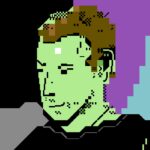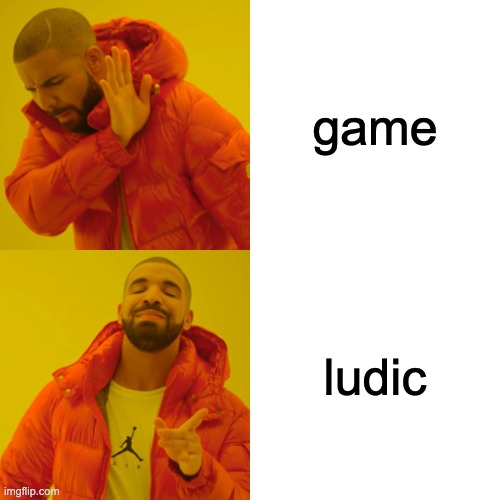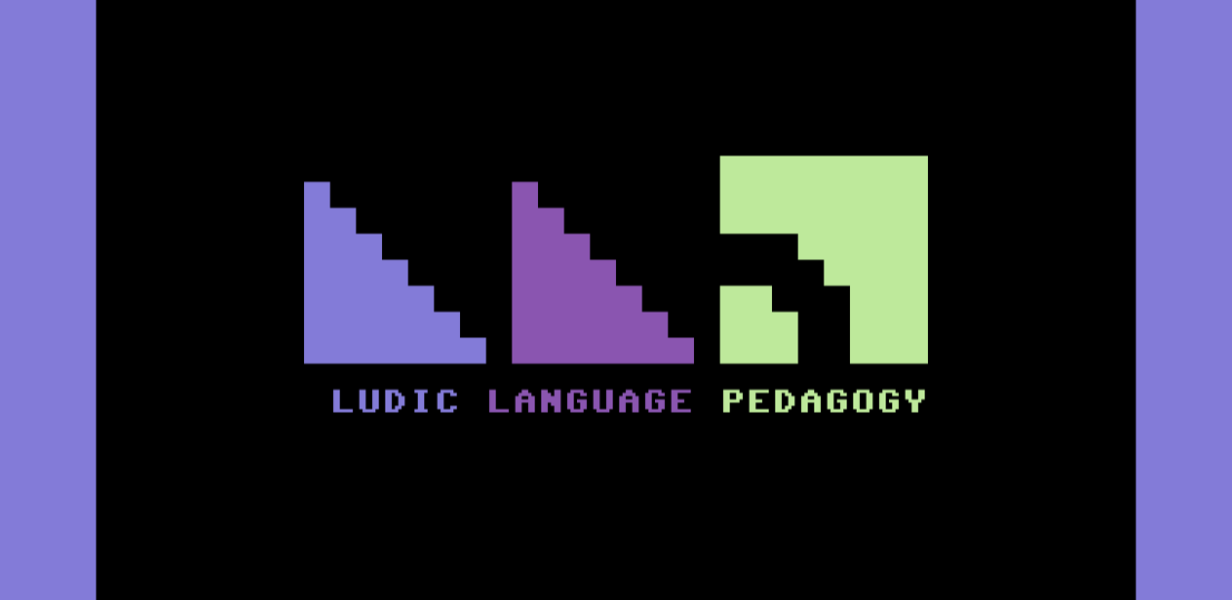Interview with Jonathan deHaan and James York about “Ludic Language Pedagogy”
Shannon and Jeff interviewed Jonathan and James about their journal/community called “Ludic Language Pedagogy”.




Question: What is Ludic Language Pedagogy? Is it an organization, a community, a journal?
TL;DR: LLP is both a journal and a community.
The journal came first, which was born out of our perception that the game-based learning movement within our field was slowly becoming a research-heavy, teacherless environment entrenched in CALL. There was no place to publish papers on TTRPGs (tabletop role playing games), LARPs (live action role playing games), role-plays, card games, or poems as forms of “ludic teaching” due to the defining term of the time: digital game-based language learning. So, although many teachers are using traditional, card or board games in their contexts, the research literature was hyping MMOs (massively multiplayer online games) and digital games instead. We saw this as a missed opportunity, and one that needed correcting in this, the Ludic Century. Thus, we started the journal as a place for us to create the change in the world we wanted to see. An inclusive field focused on praxis as an antidote to the clinical, heavily tech-skewed DGBLL (digital game-based language learning) research. We have a strong focus on what teachers do in their classrooms, as well as why and how they do it.
Once we were locked into the idea of creating a space for teachers and researchers like us, we really took our time and planned out how we would like it to be. Free, open, transparent. And that is what we have today: an open-access, open peer-reviewed journal with no (significant) overheads.
It was a very deliberate decision to start a community alongside the journal. The LLP community is designed to be a place for teachers and researchers to discuss their practices, collaborate on projects and share ideas. It is a community of practice for anyone interested in teaching and researching ludic approaches to language teaching.
Question: Why is it called “Ludic” pedagogy? What does ludic teaching mean in this context?
Zimmerman and Chaplin (2013) suggest that the 21st Century is the “Ludic Century” or “the age of play.” Games, play, and related practices are driving progress and education. Changing the term “game” to “ludic” opens the scope of what may be published within the field, creating a more inclusive and diverse environment for both researchers and teachers to publish on their ludic or playful teaching.
“Ludic,” therefore, provides an inclusive space for researchers and teachers to write about playful teaching and learning, with or without and in and around the following experiences and technologies:
- Debate
- Digital games
- Drama
- Language play (humor, jokes, poems, riddles, etc.)
- Live-Action Role-Playing Games (LARPs)
- Make-believe
- Playful worksheets, activities and puzzles
- Simulations and roleplays
- Storytelling
- Tabletop games
- Traditional games (Dice games, conversation games, playground games, etc.)

Question: What are the gaps your initiative will fill, and where do you perceive shortfalls in the traditional academic publishing model?
The journal and community are pushing the boundaries of what has been published on games and language teaching and learning so far. The trend lately has been on digital games, and on student perceptions and motivations towards gaming in their second language. The journal and community is exploring what recentering language teaching on broader ideas of “play” and all sorts of games and simulations (not just digital games, but roleplays, problem solving, and also communicative language games) can do for teachers and learners. We’re also trying to encourage teachers to look further than teaching just vocabulary or grammar with games, and to look at the language around games (for example, on social media). The journal and community is committed to helping teachers think about, integrate, and report on play and solid pedagogy in the classroom. This hasn’t been done in CALL or CLT enough and we want to help teachers do amazing things in their classroom with their students.
This is all new, and many hands make light work, so we have built the journal and community to be collaborative. Like the FLTMAG, we practice open peer review (both authors and reviewers and editors are named), so that discussions can be constructive (for example, by asking questions, providing information, continuing dialog through multiple turns). The journal is open access so that all of the knowledge that we are building will be available to everyone. The community on Discord and Twitter and in our conference (LLPx) is built to help people share information, learn more about the field, share works in progress, learn how to be a reviewer, get support on ideas and projects, and to find other people to work with.
Question: What is your mission with Ludic Language Pedagogy? What are you hoping for through the work of the organization and journal? Who comprises your network of colleagues and contributors, so far?
The mission of Ludic Language Pedagogy is to promote open, scholarly and practical conversations around purposeful and progressive uses of games and play in language teaching and learning. We are committed to promoting ideas, experiences and research that investigate the mindful intersection of games and language teaching and learning, curating materials (submitted in conjunction with manuscripts) that other teachers and researchers can use in their contexts, and communicating with the community, not only through this journal but via SNS and regular public connections (podcast, webinars, Discord channels, etc.). Our hope is that more teachers will be able to share their amazing teaching efforts and help other teachers do amazing things, too. We don’t want good ideas to stay hidden in classrooms. We also want researchers to be more in contact with teachers and classrooms and for the constraints and opportunities that teachers have to influence and support the research that is done in academia. We have a global community of graduate students, language teachers and language education researchers in our network.
Question: What kind of person would benefit from engaging in your organization and reading your journal?
As mentioned above, the LLP community is based on praxis so we like to think that we cross the research-practice divide. As such, LLP is for a diverse audience of both practitioners and researchers. In fact, we recently had a discussion on our Discord where a researcher was proposing an idea but added a disclaimer that he does not have direct access to a classroom and two teachers offered to work with him as part of the project. Currently then, the following mix of people are engaged in our community:
- For “boots on the ground” teachers we offer practical lesson plans
- Graduate students benefit from access to our papers, and collective knowledge regarding relevant literature in the field as well as by getting advice on their project proposals
- As mentioned above, professors who want to collaborate are also “Among Us”.
- Finally, a number of wannabe or actual game designers in the community. Similar to professors, they may find the LLP community a place to meet partners (teachers) for collaboration.
Question: What kinds of pieces do you accept for publication? Could you summarize or give an example?
We accept three types of pieces: articles (“hard mode”), walkthroughs (“normal mode”) and playgrounds (“easy mode”).
Articles typically map out and find gaps in relevant scholarly literature, have clear and compelling research questions, present a procedure and data to answer those questions, and end with a thoughtful discussion related to continued research and teaching. Alternatively, a submission might explain or critique a phenomenon or trend in the field. Topics include research, pedagogy, theory, and practice. Manuscripts should have clear implications for practice. We welcome all research approaches, methods, and contexts. We welcome papers that aim to push the field forwards, question the field’s current trajectory, end with more questions than they started with and create a manifesto or a call to action. DM Jones recently published “Games in the language learning classroom: Is the juice worth the squeeze?”: about which he tweets: The Freshly Squeezed, Inc. Model-A is a heuristic model intended to help you, language teachers, to carefully consider whether games are really worth implementing in your practice. After all, if the juice isn’t worth the squeeze, why bother?
Walkthroughs show what ludic language pedagogy looks like in hi-resolution. We appropriate the game design metaphor of iterative playtesting; where teachers actively improve their teaching through a process of iteration. Walkthroughs are organised into the following key sections: Background → Design → Playtest → Evaluation → Next steps. We advise teachers to include extensive media and teaching materials, such as curriculum and syllabus, lesson plans, teacher notes (e.g., diaries and observations), worksheets, student work (e.g., projects, reports, presentations, completed worksheets), tests, quizzes, grading rubrics, photos, videos, example interactions, and anecdotes. Jonathan deHaan recently published “Game Terakoya class 1” walkthrough: Directing students’ post-game discussions, academic work and participatory work through goals, curriculum, materials and interactions:” about which he tweets: Why even have students play a game in their L2?! The really great L2 stuff: – thinking deeply – social bridging happens in the discussions, analyses and project work after the game. Materials and teacher interactions make that happen.
Playgrounds are places to experiment and play which mimics real-life playgrounds on many levels. LLP playgrounds are open-access — anyone can submit or access, encourage rapid prototyping and sharing with a growing community of teachers and researchers, provide a space and tools, linked by tags, to help practitioners play, share, and build ideas with others, are a place outside of typical academia to experiment with playful, atypical, radical, or modern yet impactful academic publication formats, and are flexible to allow works in progress (WIPs), conversation starters, think pieces, but may also be peer-reviewed and published (let us give you the badge you deserve!). The LLP Playground is full of amazing teaching and research items such as lesson plans, game prototypes, short essays, annotated photos, opinion pieces, interviews, discussion notes, competitions, etc in many forms: google docs, itch.io games, and physical zines. James York recently published “👩🚀 How to teach languages with “Among Us” about which he tweets: I taught English and Japanese with @InnerslothDevs’ #AmongUsGame. Here’s some tips on how you can teach languages with this popular social deduction game, too!
Question: What do the FLTMAG and Ludic Language Pedagogy have in common?
A focus on teachers. Practical, implementable content. Open doors. A focus on raising the tide for everyone involved.
Question: What are you looking forward to in the future of Ludic Language Pedagogy? Do you have any projects that you are working on that our readers should know about?
Collaboratively writing papers together. There are a number of papers/projects on-going currently, and we are always open to more proposals. Current projects include:
☆One Game To Rule Them All
A paper exploring how a single game can be used as a teaching tool from a number of approaches to language teaching: PPP, TBLT, Multiliteracies, Connected Learning and in a game-remixing project.
☆WoW in the classroom
A group of LLPers have applied for a grant to conduct research on the classroom implementation of World of Warcraft to fill a gap in the research literature of what teaching with an MMO looks like in practice.
☆Interactive Fiction design
Following the success of the FanTales project, a number of LLPers are considering a language learning participatory project where students make short interactive fiction games as part of a global game-jam.
We also host a free, online workshop and conference called LLPx (LLP Expo). The first was in October last year (videos) and we plan to hold one in the spring of 2021.
Finally, there are always reviewing opportunities available for LLP members. We frequently publish short papers known as “playgrounds” which are interesting, thought-provoking, sometimes hypothetical, always practical pieces. Unlike articles or walkthroughs, any member of the community can be a peer reviewer for playgrounds which is a great opportunity for those that lack reviewing experience: they can provide their comments and advice in a non-judgmental, supportive environment as well as be an “apprentice” of sorts seeing more experienced reviewers provide their comments. As such, the playgrounds are a great place for situated learning to happen both for the author and reviewers alike. We’re looking forward to seeing many more playgrounds published this year.
Question: How can our readers get in touch and contribute?
- Website – https://llpjournal.org/
- Email – contact@llpjournal.org
- Discord – https://discord.gg/je9QZsnntf
- Twitter – https://twitter.com/llpjournal
- YouTube – https://www.youtube.com/channel/UCT3r_bH-pn5J-SO05YpPLnw
- Submit: https://llpjournal.org/2018/01/03/submit-work.html

